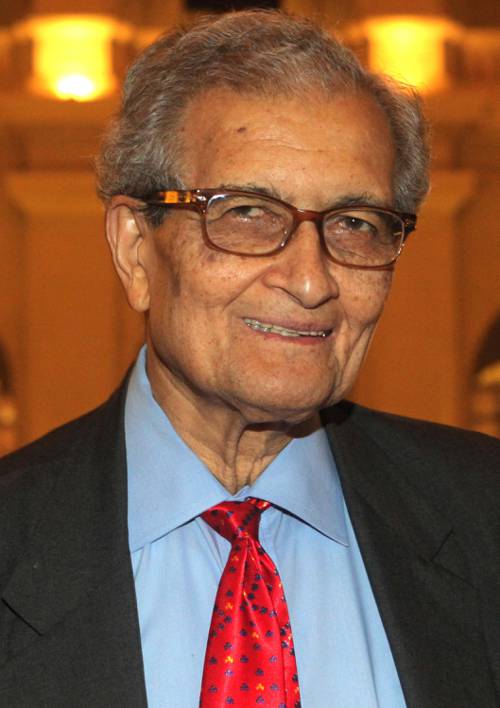
FAQ About Amartya Sen

Who is Amartya Sen?
Amartya Sen is an internationally renowned economist and philosopher, known for his work in welfare economics, social choice theory, economic and social justice, and the measurement of poverty and inequality. He was awarded the Nobel Prize in Economic Sciences in 1998 for his contributions to welfare economics.

What are the main contributions of Amartya Sen to economics?
Amartya Sen's main contributions lie in the areas of welfare economics, social choice theory, and perspectives on poverty and human development. He introduced the concept of "capabilities" in economic theory, arguing that the welfare of individuals should be measured by their ability to achieve the types of lives they value. Sen also contributed significantly to the understanding of social justice and collective decision-making processes.

What is the capability approach proposed by Amartya Sen?
The capability approach, developed by Amartya Sen, is a framework for assessing individual well-being and social arrangements, emphasizing the importance of personal abilities to achieve desired lifestyles. Unlike traditional measures of welfare, which focus on GDP or resources, the capability approach evaluates the range of opportunities and freedoms individuals have to live the life they value.

How did Amartya Sen influence the measurement of poverty and inequality?
Amartya Sen fundamentally reformed the measurement of poverty and inequality by shifting the focus from just income levels to broader concepts of deprivation and human capability. His work highlighted the importance of access to basic needs and capabilities such as education, health, and political freedom, influencing global policy on how poverty is understood and addressed.

What are some of Amartya Sen's most influential books?
Some of Amartya Sen's most influential books include "Development as Freedom", which discusses the role of freedom as central to development, "Inequality Reexamined", where he explores concepts of equality and justice, and "The Idea of Justice", which provides an approach to justice emphasizing public reasoning and human capabilities.

What is Amartya Sen's connection with social choice theory?
Amartya Sen has made significant contributions to social choice theory, which deals with the aggregation of individual preferences into collective decisions. He expanded on the impossibility results of Arrow's Theorem, proposing conditions under which a fair and rational social choice is possible, and discussed the limitations of existing voting mechanisms in capturing true social welfare.

How has Amartya Sen influenced global policy on poverty and social justice?
Amartya Sen's ideas have profoundly influenced the global policy framework on poverty and social justice. His capability approach has been instrumental in the development of the United Nations Human Development Index (HDI), which shifts the focus from economic growth to human welfare. Additionally, his work on social choice and justice has informed numerous policies and programs targeting inequality and deprivation.

What awards has Amartya Sen received?
Amartya Sen has received numerous awards throughout his career, most notably the Nobel Prize in Economic Sciences in 1998. Other prestigious awards include the Bharat Ratna, India's highest civilian award, and the National Humanities Medal from the United States. His accolades reflect his contributions to economics, philosophy, and humanitarian efforts.

Where has Amartya Sen taught during his academic career?
Amartya Sen has had a distinguished academic career, teaching at several leading universities. He has held positions at the University of Calcutta, Delhi School of Economics, London School of Economics, University of Oxford, and Harvard University, among others. His teaching and research have influenced generations of students and academics in economics and philosophy.

What is the connection between Amartya Sen and the Human Development Index (HDI)?
Amartya Sen played a crucial role in the conceptual development of the Human Development Index (HDI), which measures a country's achievements in health, education, and standard of living. His capability approach underpins the HDI, focusing on broader aspects of human welfare rather than merely economic indicators like GDP.

What is Amartya Sen's perspective on democracy and its importance?
Amartya Sen views democracy not only as a political system but also as a crucial component of development. He argues that democracy enhances public debate and accountability, which are essential for addressing inequalities and giving a voice to disadvantaged populations. Sen believes that democratic practices contribute to the process of social change and development.

How did Amartya Sen contribute to the understanding of famines?
Amartya Sen's research on famines transformed the understanding of their causes. He demonstrated that famines are often not due to food shortages but are the result of inequalities in food distribution and access. His work on the Bengal famine of 1943 highlighted how political and social factors play critical roles in exacerbating famine conditions.

What is the significance of Amartya Sen's work on "Development as Freedom"?
In "Development as Freedom", Amartya Sen argues that development should expand the freedoms people enjoy, rather than just increase economic growth. He emphasizes that true development involves enhancing personal abilities and opportunities, suggesting that economic growth should ultimately serve the purpose of expanding individual freedoms.

How has Amartya Sen contributed to public reasoning and debate?
Amartya Sen has promoted the importance of public reasoning in societal decision-making. He argues that open discourse and public debate are crucial in formulating fair and equitable policies, as they allow diverse perspectives to be considered. His work promotes the idea that justice and democracy should involve wide-ranging dialogue and reasoning among citizens.

What is Amartya Sen's contribution to gender equality?
Amartya Sen has contributed significantly to the discussion of gender equality, particularly in the context of his capability approach. He has highlighted the disparities in access to health, education, and economic opportunities between men and women, advocating for policies that empower women and remove structural barriers to equal participation in society.

How did Amartya Sen change the approach to economic measures of human welfare?
Amartya Sen changed the approach to economic measures of human welfare by introducing the concept of capabilities. His focus shifted the emphasis away from traditional economic indicators like GDP toward a broader assessment of what individuals can actually achieve with available resources, offering a more comprehensive view of human welfare and quality of life.

What is the relationship between Sen's capability approach and international development?
Sen's capability approach has had a profound impact on international development by refocusing attention on human well-being rather than purely economic metrics. His ideas have influenced development organizations and aid programs to prioritize human capabilities and freedoms, emphasizing health, education, and empowerment in development strategies.

What role did Amartya Sen play in redefining the theories of social justice?
Amartya Sen redefined theories of social justice by challenging traditional notions that emphasize resource distribution and proposing a focus on capabilities and human freedoms. His work encourages a more nuanced understanding of social justice that considers what individuals can do and be, thus broadening the scope of equality and fairness in society.

How has Amartya Sen's work impacted the field of philosophy?
Amartya Sen's work has significantly impacted philosophy by integrating economic thought with ethical, political, and social considerations. His ideas on capabilities, social choice, and justice have influenced contemporary philosophical debates, particularly in normative ethics and political philosophy, contributing to interdisciplinary discourse between economics and philosophy.
